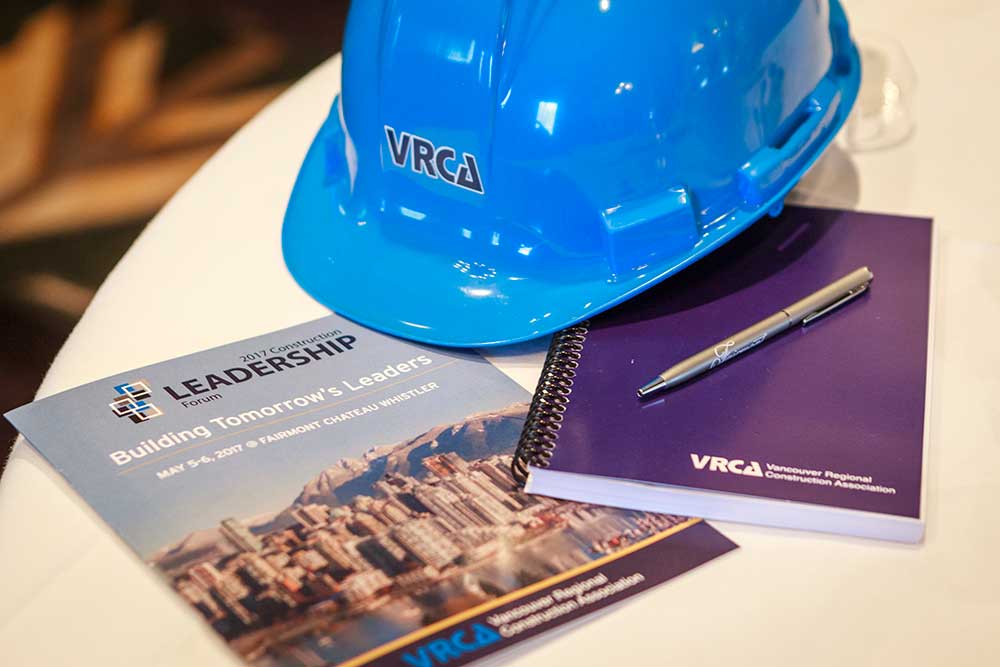By Anna Guy
 The Vancouver Regional Construction Association (VRCA) is the oldest and largest construction association in British Columbia with a rich history that spans almost 90 years. It is the 5th largest in Canada serving almost 700 general and trade contractors, manufacturers, suppliers and service providers such as architects, engineers and insurance providers, who operate in the industrial, commercial and institutional construction industry.
The Vancouver Regional Construction Association (VRCA) is the oldest and largest construction association in British Columbia with a rich history that spans almost 90 years. It is the 5th largest in Canada serving almost 700 general and trade contractors, manufacturers, suppliers and service providers such as architects, engineers and insurance providers, who operate in the industrial, commercial and institutional construction industry.
VRCA’s members are small, medium and large union and non-union businesses in the Lower Mainland, Fraser Valley and Sea to Sky region, who build vibrant communities and state of the art schools, highways, hospitals, community centres and infrastructure we use every day. They are part of a $16-billion-dollar industry that provides 8.6 per cent of BC’s wealth and employs more than 225,000 men and women, making it the largest employer in BC’s goods sector.
BC’s industry
Construction is an important solution for climate change as it responds to urbanization demands and is a consumer of new technologies and materials. BC’s industry has some key milestones on its horizon:
- By 2026, the sector is projected to face a skilled labour shortfall of approx. 15,000 jobs.
- By 2032, the industry will be building carbon neutral buildings.
- By 2041, one million people are expected to have relocated to Metro Vancouver.
The industry is therefore under upwards pressure to build faster, greener and more productively than ever before. Therein lies the challenge and the opportunity for the industry and associations like VRCA.
VRCA’s vision
VRCA believes it is a conduit to the future. It believes it has a role to play to inform how the construction industry evolves. And it knows it has to evolve itself.
VRCA’s M.O.
VRCA’s Board of Directors is a progressive group focused on writing the next chapter of the association’s history so that it builds on the good work of the past and has a positive impact on the future. The board believes that excellence, underpinned by a culture of learning and innovation, is a critical factor for the survival and prosperity of VRCA’s members and BC’s construction industry as a whole.
VRCA’s team is equally inspired. At the helm is Fiona Famulak, a Scottish Chartered Accountant who is passionate about engaging members, connecting stakeholders, delivering a memorable experience through every exchange and getting things done. The team is equally inspired by the work undertaken by VRCA’s members. So inspired, in fact, that it considers itself a part of members’ teams and is ready to support as needed.
Innovation Though Education, Advocacy and Facilitation
It is this energy and clarity of purpose that has informed VRCA’s 2017-2020 strategic plan, a roadmap that focuses on excellence through adoption of best-in-class approaches, innovative construction processes, technologies, materials and business strategies as a way to bring about the transformational change the industry needs to stay competitive.
VRCA plans to elevate to a new level its industry roles – to Educate, Advocate and Facilitate – through the evolution of current, and the development of new programs and services to harness the opportunities and address the challenges facing members now and in future. The three pillars are underpinned by a foundation of four business goals to optimize the use of VRCA’s building, achieve full brand recognition as a construction centre of excellence in the marketplace, continue to adopt best practice board governance and operational processes and procedures, and achieve long-term financial viability.
Why is education important? “Education is a bridge to excellence,” says Famulak. “We want to foster a culture of continuous learning across the industry by offering world-class technical and non-technical training.”
According to BuildForce Canada’s 2017-2026 Construction and Maintenance Looking Forward report, British Columbia’s labour market will be put to the test over the next decade, as the need to resource major projects will put a strain on the available local workforce. Retirements are expected to draw 22 per cent of the current labour force or an estimated 40,000 workers from the province’s construction industry over the next 10 years, creating a significant skills vacuum that will require innovative and proactive planning to successfully navigate.
VRCA plans to do everything in its power to help members and future members ensure knowledge transfer takes place on site and in the workplace and is supplemented by appropriate training and education. The continued evolution of its education program will leverage current and new educational partners where appropriate, so that it resonates with and supports the various demographics in the industry from an apprentice to a C-Suite executive. It also includes the continued roll-out of education designed specifically for public sector employees. Learning opportunities such as VRCA’s annual Construction Leadership Forum for middle-managers, and its recently launched Infrastructure Masterclass for public sector employees will therefore continue the evolution, as will the introduction to members of international thought leaders like the BIM Academy from the UK.
Why is advocacy important? “We want to foster an environment that encourages collaboration, innovation and adoption of standard practices to promote fair, open and transparent business practices.” says Famulak. Whether it is because of the influx of new technologies or the increasingly demanding performance requirements imposed by governments and the public, construction projects are becoming more complex. Architects, engineers and contractors (the AEC industry) must work closer together and with the owner community to ensure value is delivered in the most efficient and effective manner.
Those who work on the front line of the construction industry have long been aware of the challenges that stand in the way of efficient project delivery. For owners and clients, budgets are increasingly constrained and more must be done with less. For the AEC companies, issues like managing the work and risk associated with incomplete design drawings, use of non-standard contract documents, securing prompt payment for work complete and managing the changing demographics within the industry contribute to less than efficient project delivery. All at a time when margins are historically low for all parties.
VRCA’s response is to engage collaboratively with members and the public sector to foster mutual understanding of key industry issues with a view to achieving positive outcomes. To address the looming skills shortage, VRCA will continue to engage students and teachers through its School Outreach Program, where industry volunteers, many from VRCA’s Under40 Network, present the myriad career opportunities in construction to the captive audience. “Currently 1 in 69 students pursue a skilled trade on leaving high school.” notes Famulak. “We need to get that ratio to approximately 1 in 7, if we are to respond effectively to the 2026 projected labour shortage.”
Why is facilitating connections important? “Our industry depends on connections,” says Famulak. “Connections to people, bidding opportunities and, because the majority of members are small-medium enterprises, ways to save money are crucial. We therefore want to enable connections and opportunities across the industry by offering a range of business-oriented programs.”
It’s why VRCA offers 20+ events per year that connect 3,500+ attendees. It’s why it offers access to close to 1,000 Pre Bid and 4,500+ bidding opportunities per year through its BidCentral platform. It’s why it offers its members the BCCA Employee Benefits Plan that is tailored specifically for construction companies, and numerous other affinity partners.
“As the industry’s one-stop-shop for programs and services, we help members save time so they can focus on what they do best.” adds Famulak.
Looking to the future
VRCA is helping the industry evolve so that it can build faster, greener and more productively than ever before. It is changing perceptions, dispelling myths and helping to resolve persistent problems. And it is promoting construction as a cool industry to work in. It has support from inside and outside the industry, possesses direct lines into local and national innovation champions as well as thought leaders in the UK, Europe and US including the World Economic Forum.
Change is not easy. It takes courage, time and effort. VRCA, through its engaged board, passionate staff, diverse member base and stakeholder network is leading the charge.
The future starts now.






